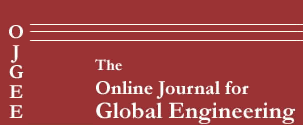Abstract
Engineering graduates encounter worlds of professional practice that are increasingly global in character. This new reality poses challenges for engineering educators and employers, who are faced with the formidable task of preparing engineers to be more effective in diverse national and cultural contexts. In response, many commentators have proposed lists of attributes or competencies deemed important or even essential for global engineering work. However, such lists have tended to lack explicit grounding in empirical studies of engineering practice, including typical kinds of work situations and related behavioral requirements. As a step toward establishing a more robust definition and developmental theory of global engineering competency, this paper reports results from a wide-ranging literature review on engineering practice in global context. The findings are organized around three main contextual dimensions of global engineering competency: technical coordination; engineering cultures; and ethics, standards, and regulations. Particular efforts are made to relate our findings to prior discussions of what it means to be a globally competent engineer, while further illustrating each dimension by giving examples drawn from interviews with practicing engineers. The paper concludes with a review of ongoing and future work, including how our findings are inspiring creation of situational prompts and activities for both assessment and instructional uses.
Recommended Citation
Jesiek, Brent K.; Zhu, Qin; Woo, Sang Eun; Thompson, Julia; and Mazzurco, Andrea
(2014)
"Global Engineering Competency in Context: Situations and Behaviors,"
Online Journal for Global Engineering Education:
Vol. 8:
Iss.
1, Article 1.
Available at:
https://digitalcommons.uri.edu/ojgee/vol8/iss1/1
